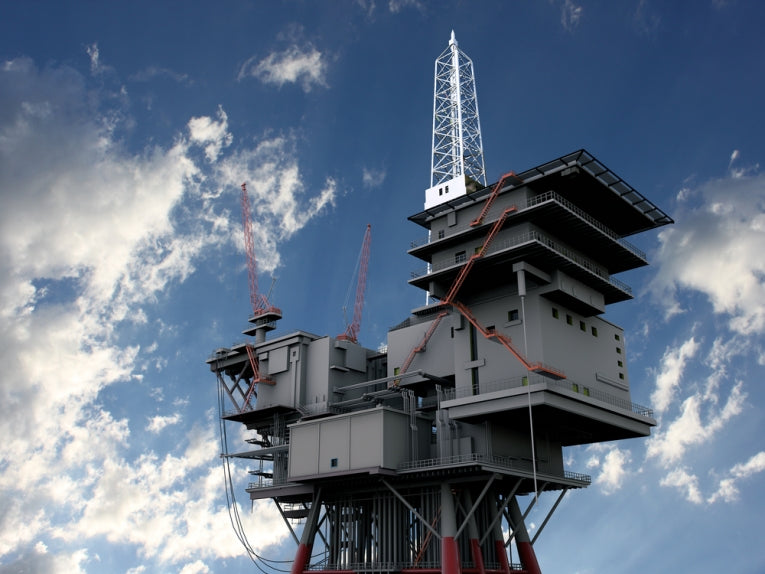With Arctic sea-ice plummeting to a record low this year, with Greenland's ice-sheets suffering weeks of unprecedented '97% surface melt', leaders are now finally taking decisive action. But we're not talking about President Obama calling a crisis meeting, tabling bold measures to avert the impending climate shock. Most world leaders seem determined to look the other way, with climate change remaining one of politics's dirty words. No, it is the leadership of oil and mining companies who are getting all frenetic over the Arctic. And not to save the it - but to exploit it.
As ice becomes an increasingly endangered species up North, its disappearance is opening up a new vista of exploration and exploitation, one many big resource companies find hard to resist. Shell has been drilling for oil in Chukchi Sea, north of Alaska. French oil company, Total, is eying-up gas prospects along Russia's Arctic shelf. And Australian mining companies are getting all excited by the prospect of Greenland's glaciers losing their grip.
The Arctic, it seems, is fast-becoming the front-line for the developing climate crisis, and for our response to it.
Shell's drilling hits storm of safety concerns
First off the blocks has been the Anglo-Dutch oil giant, Royal Dutch Shell. They were given the green light to re-start their drilling campaign last month, by President Obama. The initial license had some limits - Shell weren't allowed to drill into oil-bearing rocks until their oil spill containment barge was deployed - but the intent was clear. The Arctic is being opened up for business: Big Oil business.
That has many worried, and not just the usual suspects such as Greenpeace and Friends of the Earth. In the UK, the Parliamentary Environmental Committee slammed the haste with which oil and gas companies are rushing northwards. The chair of the Committee, Joan Walley MP, said 'we are witnessing a reckless gold rush in this pristine wilderness, as big companies and governments make a grab for the world's last untapped oil and gas reserves.'
Throwing down charges of 'reckless' is much more than just hyperbole. A big worry is the extremely hostile environment into which oil companies are stepping. The massive Deepwater oil spill, in the warm benign waters of the Gulf of Mexico - right on the doorstop of the US oil industry, with all its resources close to hand - was a struggle for BP to clear up. The Arctic Circle lacks anything close to that sort of infrastructure to aid in spill clearance. And despite its rapid melt in the summer, the Arctic remains an ocean with a savage bite.
Arctic bites back
Hurricane-force storms are becoming more common, even in summer. The sea-swell can lift as high as 20-feet. And with ice-floes as thick as 25-feet, and regularly as large as New York city, this is no playground, even for a company as well-resourced as Royal Dutch Shell. The consequences of an oil well failure - just as the northern winter descends, blanketing the region in sea-ice gain - simply don't bear thinking about.
And that sort of scenario is far from unlikely. This year's drilling campaign was bought to an abrupt halt, first by a failure in the oil containment device that Shell had bought up to the Chukchi Sea in case of a spill - and then by the rapid approach of a wedge of ice-floes, 30 miles long and 12 miles wide. Even fellow oil & gas companies are nervous -even if just from a PR perspective.
Total casts the first stone
'Oil on Greenland would be a disaster. A leak would do too much damage to the image of the company," said Total's chief executive, in an interview with the Financial Times. Total excuses its own plans for drilling for gas in the Arctic, in Russia's Barents Sea, because 'gas is easier to clean up than oil'. There may be some merit in that argument. But it skirts perhaps the most poignant aspect of the scramble for Arctic resources.
A spill the region would indeed be ruinously dangerous for the ecosystem of the far North, from plankton to whales to polar bears. But a successful campaign to extract and burn the massive oil & gas reserves of the Arctic oceans - estimated as 30% of the gas and 13% of oil yet-to-be found - would be an even greater disaster for the world's climate.
It is the burning of fossil fuels, like oil and gas, that is tipping us over the edge into a breakdown of the climate system. It is the warming from CO2 emitted from power stations and car exhausts which is melting the Arctic sea-ice. Is the best we can do in response to burn yet more oil and gas, making climate chaos a certainty - all in the name of profits for Big Oil?










